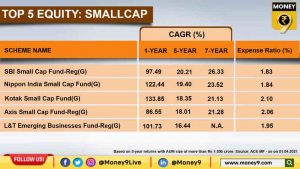Up to 134% return: These 5 small funds delivered big returns in past one year; do you own any?
Smallcap funds are a type of equity mutual funds that invest in small-sized companies

Risk hai to ishq hai — This famous dialogue of the web series ‘Scam 1992: The Harshad Mehta Story’ has become very popular. The inference of this dialogue is by taking risks in the stock market, you will earn a high return. Influenced by the web series or the dialogue, if you are willing to take risk in lieu of huge returns, then smallcap mutual funds is the perfect category for you to invest in.
So, let us first understand what are small-cap mutual funds.
Small-cap equity funds
Smallcap funds are a type of equity mutual funds that invest in small-sized companies. Before the 2018 SEBI reclassification exercise, most fund houses had their definition of small caps. The 2018 exercise brought standard definition, and since then, anything below seven thousand crores, which is the 251st company and lower, is a small cap.
This definition of small caps also highlights a large universe of companies that the small cap fund managers have to work on. While over 6,000 companies fall into the smallcaps category, not all can be deemed worth investing. A fund manager chooses 30-40 smallcaps from such a big universe of companies.
Understanding the risks
While small-cap funds have the ability to double or triple your money over the long-term. These funds are risky since they are easily impacted by the volatility of the market. They carry a high risk-return tradeoff, which makes them ideal for investors with a high-risk appetite.
Investment horizon
Small-cap funds face substantial erosion of returns when the market starts going downwards. Hence, to allow the fund to generate returns according to your expectations, you need to stay invested for the long term. A long-term investment horizon is when you consider this option for a time horizon of 7-10 years.
Best performing small-cap schemes
Now that you have understood what small-cap equity funds are and the risk associated with them as well as the investment horizon required for it. Let’s now look at the top five small-cap equity fund schemes:

Tax implications
When you redeem the units of a small-cap fund, there will be taxable capital gains. The rate at which you will be taxed depends on the period for which you stayed invested in the scheme – the holding period.
The tax rates are as follows:
Short Term Capital Gain (STCG) – A holding period of up to one year. STCG is taxed at 15%.
Long Term Capital Gain (LTCG) – A holding period of more than one year. There is no tax on LTCG of up to Rs. 1 lakh. Above this amount, LTCG is taxed at the rate of 10% without the benefit of indexation.
(Disclaimer: The above list is for informational purpose only. Before investing, please consult your financial advisor)

